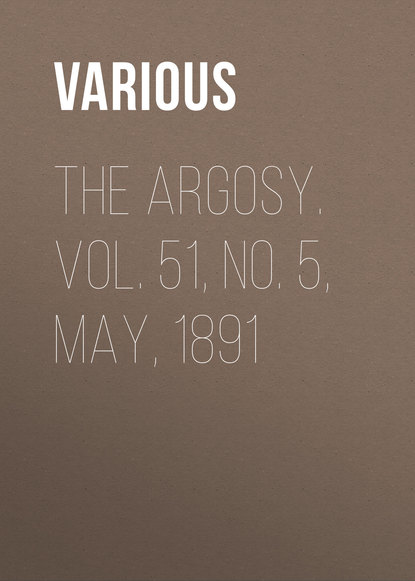 Полная версия
Полная версияThe Argosy. Vol. 51, No. 5, May, 1891
"Janet," he said.
With a little cry, and a sob, the girl rushed into them.
I went away back to my own room. I am sure it is superfluous to explain my little plot: that it was not a photograph, but an old miniature of Paul I had seen Janet with—an old miniature which I had painted on ivory myself in the far-distant days. I am sure Paul never had a photograph taken. Of course it was because I had recognised this that I wanted Paul to wait in the library; but he was a better fencer than I, and made me admit more than I intended. I sat down now, a world of old memories whirling through my brain. I mixed this that I had just seen—with something very like it in the long, long past—with the crash of pots, and another figure that had thrown itself into Paul's arms. There was the old room: Janet had been said there, too; and the lips through which the word had trembled were the same: and the voice was the same also. Only the figure that had darted forward—was different.
I did not go to bed at all that night; but sat looking out over the quiet, moon-lit garden and over the fields beyond, where the corn-crake was calling, calling; the river slipping like a silver thread at the far-away end of them; and patter, patter out and into the back-garden at Glasgow went the little feet again; and to and fro ran the fair-haired little lassie in the dirty pink cotton, tugging me this way and that by the hand; and such a singing and swinging went on about the stairs. Oh, how I wondered whether Paul would ever tell Janet her mother's story.
I was not going placidly away north this time, to wait to hear more about anything by-and-by. I did not leave that factory-like erection of Duncan's until I had seen them married.
THE CHURCH GARDEN
"We cannot," said the people, "stand these children, Always round us with their racketing and play;Yon Church-garden set right down among our houses Is really quite a nuisance in its way!"True, their homes are very dull, and bare, and dismal, And the narrow courts they live in dark and small,And we think they love that sparsely-planted acre— But we do not want to think of them at all!"There are surely parks enough to make a play-ground, And we might be spared these noisy little feet;But the parks, the Clergy say, are all too distant, And so they planned this garden in the street!"No doubt the seats are pleasanter than curb-stones, While the trees make quite a shelter from the sun,And the grass does nicely for the crawling babies— But somebody must think of Number One!"And the air the children get of course is purer; But then the noise they make is very great,With their laughter and their shouting to each other, And the everlasting banging of the gate!"And the wailing of the sickly, puny babies Is enough to fret one's spirit through and through—No doubt they cry as much in those dark alleys— But then we never hear them if they do!"Half the Parish talks to us of self-denial, Of kindly duties lying at the door,And of One who says the Poor are always with us; But we can't be always thinking of the Poor!"We are older, we are richer, we are wiser; Why should we be vexed and troubled in our ease?Just because the children like the Vicar's garden, With its faded grass and smoky London trees!"Still we feel sometimes a little self-convicted, When we hear the hard-worked kindly Clergy sayThat it helps them often in their weary labours, Just to see the children happy at their play!"Yet we think they try to make the thing too solemn, When they put aside our protests with the plea:'Whatsoe'er ye did to such as these, my brethren, To the least—ye did it even unto Me.'"Thus the people murmured, but the children's Angels Smiled rejoicing, and a richer blessing fallsOn the Church that made a shelter for the children Underneath the holy shadow of her walls.Christian Burke.


